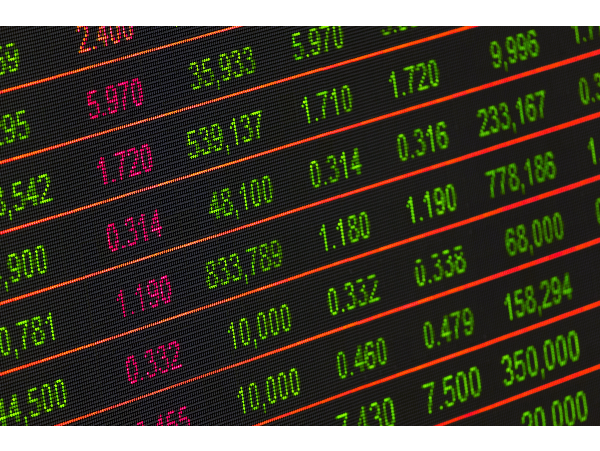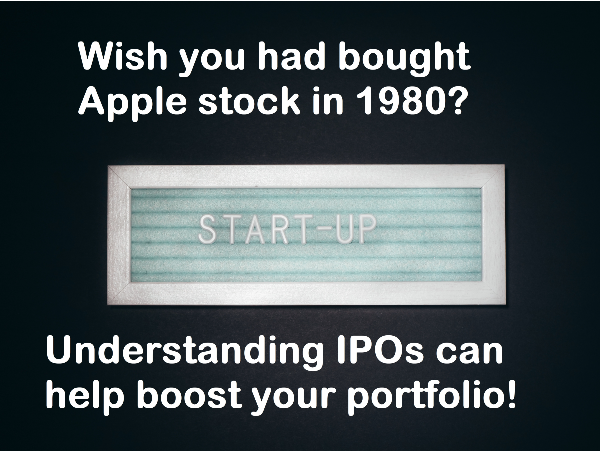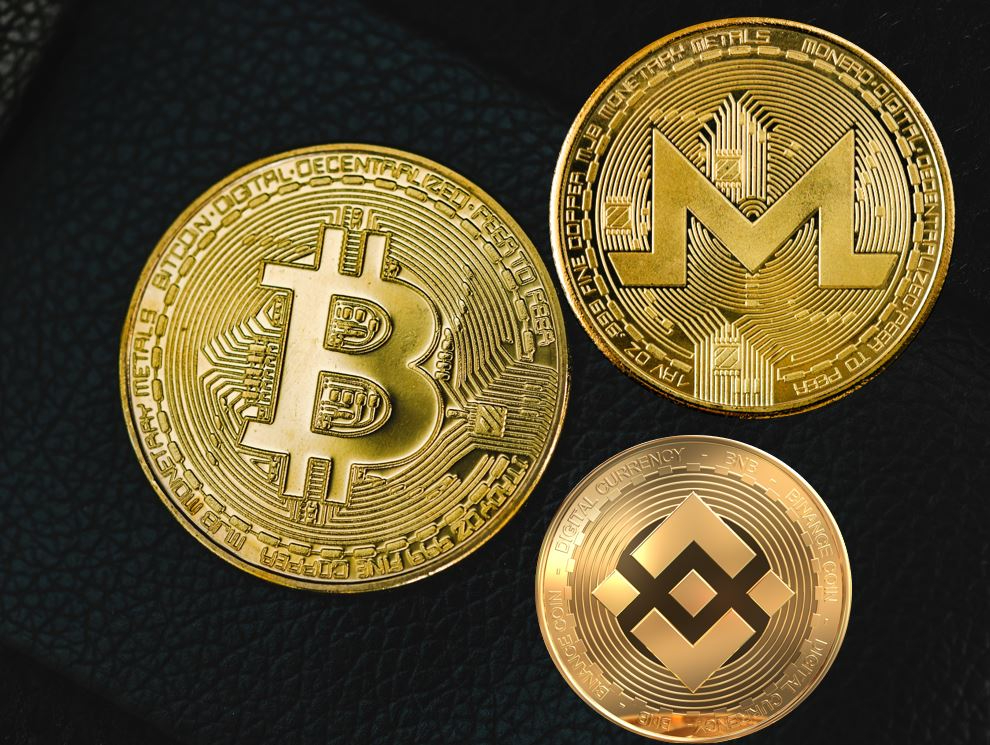Most people begin their investing journey with mutual funds, ETFs, and stable blue chip stocks. These investments are sensible and relatively low risk. However, sometimes investors want the thrill of investing in a startup - a new company that is trying to make it big. If you've ever been inspired by statements like "if you had invested $1,000 in Microsoft in 1980 you it would be worth $425,000 today," you need to learn about IPOs.
An IPO is an "Initial Public Offering" of a corporation's stock to the public, and so is also known as "going public." For the first time, this corporation's stock can now be traded on the stock market, meaning you can buy it through your investing apps or brokerages. Typically, an IPO is only available to companies that have reached a valuation of $1 billion or more.
 To "go public" on a stock exchange, a corporation must meet both Securities & Exchange Commission (SEC) and individual stock exchange requirements. Both the SEC and the exchanges (NYSE and Nasdaq) want to ensure the new stock performs relatively well, or it will shake investors' faith in the markets. Thus, an IPO is a sign that a company has a healthy foundation. However, there have been some notable IPO crashes!
To "go public" on a stock exchange, a corporation must meet both Securities & Exchange Commission (SEC) and individual stock exchange requirements. Both the SEC and the exchanges (NYSE and Nasdaq) want to ensure the new stock performs relatively well, or it will shake investors' faith in the markets. Thus, an IPO is a sign that a company has a healthy foundation. However, there have been some notable IPO crashes!
Once an IPO occurs, the value of the new stock can rise or fall. Those who get rich quick on IPOs are investors who had shares of stock before the IPO...and the IPO share value came in higher than what they bought their shares for. The IPO price per share is determined by underwriters working for the investment bank that handles the mass sale of stock. This is based on the valuation of the company and supply and demand for the company's stock: How many shares is the new corporation selling, and how many shares do institutional investors like mutual funds, pension funds, and wealthy mega-investors want to buy?
If the investment bank. handling the IPO gives a higher IPO price than pre-IPO investors paid, those investors can immediately sell their many shares of stock for profit. Pre-IPO investors are composed of three main groups: Angel investors, stock options, and pre-IPO placement investors. Angel investors include venture capital firms that privately fund companies for a stake in ownership - meaning shares of stock.
 Stock options are compensation plans where employees of companies are given shares of stock as part of their pay, either as part of their regular compensation or as a bonus. Startups frequently offer stock options to employees to compensate for lower salaries and fewer benefits, as well as to encourage performance and instill loyalty. This is how employees of startups can become millionaires overnight when an IPO is highly successful - they already owned thousands of shares of stock!
Stock options are compensation plans where employees of companies are given shares of stock as part of their pay, either as part of their regular compensation or as a bonus. Startups frequently offer stock options to employees to compensate for lower salaries and fewer benefits, as well as to encourage performance and instill loyalty. This is how employees of startups can become millionaires overnight when an IPO is highly successful - they already owned thousands of shares of stock!
If you're now a wealthy angel investor or employee of a startup, you can still get pre-IPO stock by purchasing shares directly from the startup before it goes public. Startups can sell shares directly online to individuals who confirm that they understand the risk. To buy shares, one must verify that he or she understands that the IPO value could come in lower than expected, or that the company might not end up going public after all.
 One source of pre-IPO risk is that the company's stock performance is unknown - it has no trading history! Unlike publicly-traded corporations, which must publish lots of quarterly and annual data, startups can selectively divulge information. During the pre-IPO stage, when trying to raise funds, startups are going to portray themselves in the most positive light possible! Investor communities online can be good sources of questions and issues to consider when trying to estimate how a startup will perform.
One source of pre-IPO risk is that the company's stock performance is unknown - it has no trading history! Unlike publicly-traded corporations, which must publish lots of quarterly and annual data, startups can selectively divulge information. During the pre-IPO stage, when trying to raise funds, startups are going to portray themselves in the most positive light possible! Investor communities online can be good sources of questions and issues to consider when trying to estimate how a startup will perform.
If you decide to buy pre-IPO shares, you will likely be required to hand over a minimum investment amount, such as $1,000 or more. Unfortunately, this means you cannot simply purchase one share! In order to raise sufficient funding, the company requires a minimum amount from all pre-IPO investors. However, if you can afford the minimum investment at the pre-IPO stage, you could make significant profit if the eventual IPO is successful.
Deciding to buy pre-IPO stock means you need to get comfortable accepting higher risk and doing research on the startup you wish to invest in. If you make good picks, you can make lots of profit!
















Most people begin their investing journey with mutual funds, ETFs, and stable blue chip stocks. These investments are sensible and relatively low risk. However, sometimes investors want the thrill of investing in a startup - a new company that is trying to make it big. If you've ever been inspired by statements like "if you had invested $1,000 in Microsoft in 1980 you it would be worth $425,000 today," you need to learn about IPOs.
An IPO is an "Initial Public Offering" of a corporation's stock to the public, and so is also known as "going public." For the first time, this corporation's stock can now be traded on the stock market, meaning you can buy it through your investing apps or brokerages. Typically, an IPO is only available to companies that have reached a valuation of $1 billion or more.
Once an IPO occurs, the value of the new stock can rise or fall. Those who get rich quick on IPOs are investors who had shares of stock before the IPO...and the IPO share value came in higher than what they bought their shares for. The IPO price per share is determined by underwriters working for the investment bank that handles the mass sale of stock. This is based on the valuation of the company and supply and demand for the company's stock: How many shares is the new corporation selling, and how many shares do institutional investors like mutual funds, pension funds, and wealthy mega-investors want to buy?
If the investment bank. handling the IPO gives a higher IPO price than pre-IPO investors paid, those investors can immediately sell their many shares of stock for profit. Pre-IPO investors are composed of three main groups: Angel investors, stock options, and pre-IPO placement investors. Angel investors include venture capital firms that privately fund companies for a stake in ownership - meaning shares of stock.
If you're now a wealthy angel investor or employee of a startup, you can still get pre-IPO stock by purchasing shares directly from the startup before it goes public. Startups can sell shares directly online to individuals who confirm that they understand the risk. To buy shares, one must verify that he or she understands that the IPO value could come in lower than expected, or that the company might not end up going public after all.
If you decide to buy pre-IPO shares, you will likely be required to hand over a minimum investment amount, such as $1,000 or more. Unfortunately, this means you cannot simply purchase one share! In order to raise sufficient funding, the company requires a minimum amount from all pre-IPO investors. However, if you can afford the minimum investment at the pre-IPO stage, you could make significant profit if the eventual IPO is successful.
Deciding to buy pre-IPO stock means you need to get comfortable accepting higher risk and doing research on the startup you wish to invest in. If you make good picks, you can make lots of profit!